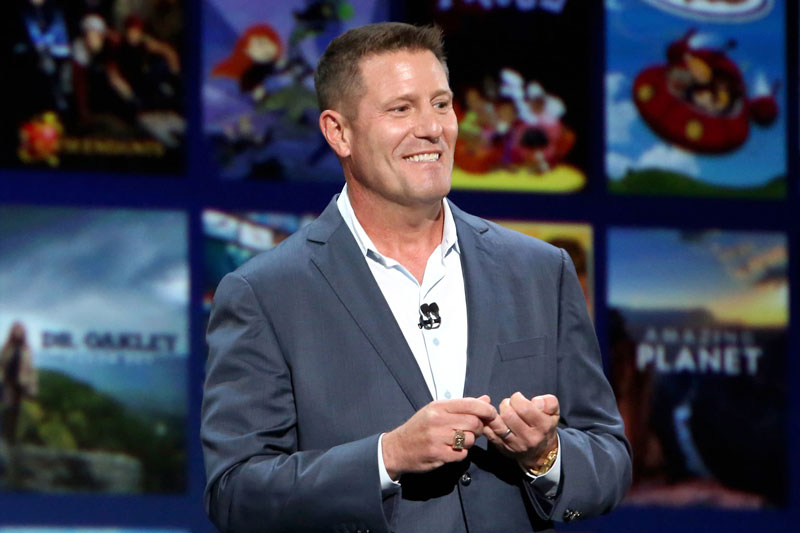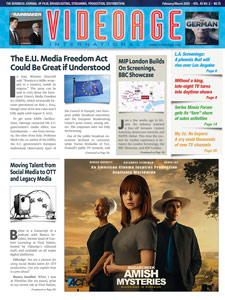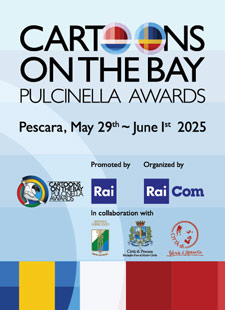In May, The Los Angeles Times ran a lengthy article about how to pronounce the name of the newest sports platform, DAZN. Apparently, according to the paper, not even Jerry Jones, owner of the American football team, the Dallas Cowboys, knew the correct pronunciation, which the Times said is “Da Zone.” Jones was promoting a boxing match taking place in his team’s stadium that was streamed on DAZN.
Since the London-based OTT sports subscription video streaming service launched — first in Europe, and then in Japan in 2016 — and is owned by Ukraine-born Sir Leonard V. Blavatnik, some people thought that the “Da” was “yes” in Russian.
The 64-year-old Blavatnik is now the U.K.’s richest man. In 1986 he founded Access Industries in New York City, which in 2014 increased its stake in Perform Group media company — which became DAZN in 2015 — from 42.5 percent to 77 percent.
In March of 2021, Kevin A. Mayer was appointed chairman of DAZN on a non-executive basis. He’d previously served a short stint — just three months — as the CEO of China’s Social Media site TikTok, which he joined after he wasn’t named Disney’s CEO after Bob Iger stepped down. He left TikTok after then-president Donald Trump began to wage war against it. Before that he served as the chairman of the Direct-to-Consumer and International division of The Walt Disney Company. In 2020 he launched Disney Plus. During his tenure he also launched ESPN Plus and ran Hulu.
VideoAge’s interview with the 59-year-old Mayer was originally set for September 10, 2021, but the eventual 15-minute Zoom call didn’t happen until November 9 due to several postponements caused by Mayer’s frequent travels from his Los Angeles base to DAZN’s headquarters in London. During that time he was also appointed as a consultant for Discovery amid its WarnerMedia merger. Another reason for pushing the interview off was due to developments happening with Forest Road Acquisition II, a company he formed in 2021 with Disney alum Tom Staggs. Recently, Forest Road acquired Moonbug Entertainment for $3 billion, and previously acquired Reese Witherspoon’s Hello Sunshine for $900 million. For DAZN he had to approve a 2.5 billion euro (U.S.$2.88 billion) deal for 10 weekly football matches of Italy’s Serie A, of which seven are exclusive and three are to be shared with Comcast’s Sky.
Originally, VideoAge presented Mayer with 17 questions, but his PR team nixed two. It was possible that these queries were too sensitive in relation to other questions about going public. When asked about that, Mayer responded, “At some point. We have no current plans to go public at a pre-determined time.”
Moving on to DAZN’s most important territories. Mayer considers them to be Japan (for baseball), and Germany, Switzerland, Austria, and Italy for football. All launched in 2016, except Italy, which arrived in 2018, together with the start of the service in the U.S.
The service was also launched in Canada in 2017, and in Spain and Brazil in 2019. Today it is available in some 200 markets, boasting an estimated 11 million subscribers who are paying monthly subscription fees that vary from 14.99 euro (U.S.$17.30) in Germany to 29.99 euro (U.S.$34.50) in Italy. In the U.S. the cost is $19.99 a month. Usually, the subscription costs on DAZN’s app and those of its distribution partners tend to be the same. Specifically, he said that sub fees depend “on what rights we have and what the customary charges have been in the past for those rights and for consumers.”
As for the profile of the target viewer, Mayer said that it had traditionally been male sports fans between the ages of 18 and 54. He added: “We are expanding the women’s market with our global partnership with the UEFA Women’s [football] Champions League, and with world class female fighters through [the promotion company] Matchroom Boxing. Generally speaking, women’s athletic events are rivaling that of the male events. You’ll see a growing number of female subscribers to DAZN as those sports become more prominent.”
Mayer also explained that “we have put [UEFA — the European section of the World Cup qualification — Women’s Champions League] on DAZN and YouTube and we are trying to grow the affinity, exposure, and the reach of this great game. Slowly we will move it off of YouTube and on to DAZN.”
The service in Italy, however, is plagued with piracy, an industry-wide problem, and had three outage incidents early in the Serie A season, to the point that the Italian communications regulator, AGCOM, is ruling on a set of quality transmission standards. Both issues, in the opinion of Mayer, are being addressed.
According to Enrico Callerio, editor of the Italian TV technology publication MonitoR, the problem is in the content delivery networks (CDNs), which are separate from TimVision’s and DAZN’s operation systems. The CDNs serve to bring the digital content very close to the subscribers’ homes. Up until recently, DAZN utilized CDN from Limelight, a U.S. company that has only two CDN centers in Italy — not sufficient by itself to manage the huge traffic generated by a Serie A match. DAZN now has more extensive CDNs (5 in total) also provided by companies such as Akamai, Amazon, and Cloudfare, plus a network of 40 local CDNs, called DAZN Edge.
As far as piracy is concerned, Mayer reported that it “is fairly robust,” and that the problem, also due to password sharing, “can only be mitigated. There are ways to mitigate it and we are exploring those,” he commented.
Asked if they could turn pirates into subscribers, he answered, “We can turn a lot of them into subscribers as a lot of them are avid fans. We are pricing our service very fairly and we have brought them a lot of value.”
An area of expansion for DAZN is to increase pre-game, post-game, and general sports analysis. “If you can capture time and attention that is inexpensive compared to the sports rights,” he said, “it’s a good value for money. Those analysis shows are super important and they’re very compelling. We have something called the DAZN Boxing Show in multiple markets and it does really well for us. Of course, where we have football, we also have analysis shows too. You have to have it and it is really good value for the money.”
Other areas of expansion are in advertising. “There is a massive shift from non-targeted linear video to targeted high quality OTT video and we are a beneficiary of that,” Mayer commented. “So those rights, once we get them and can monetize them… We will be in a better position to get those rights when an auction comes along.”
He added: “We will also add value to those rights in the future by introducing gaming and sports betting in territories where it is regulated and allowed, and by introducing e-commerce opportunities to buy sports-related memorabilia, both physical and digital, on our site. The digital can include NFTs [or digital art assets] where we have rights for those.”
DAZN is also looking into expanding partnerships in major European markets. “In some cases,” said Mayer, “it might be Sky. It could be local telcos and it could be other distributors. But those telecommunications companies, either pay-TV or Telcos, are the most logical partners.”
As for DAZN developing its own programming, Mayer explained, “We don’t want to make an undue investment there but we have some great stuff — a project from Eva Longoria, La Guerra Civil, about Latin American boxing. We also have a Ronaldo series, Ronaldo: El Presidente. People generally come to sports streaming services for live sporting events — that’s obviously where we are putting most of our money. But when you get them there and you can have some programming, or studio programming, that is talking about the matches that are about to come, or the matches they just saw about the league that they are covering, that is good and not expensive to have and we have a lot of that already. And some on-demand, pre-programmed unscripted series are interesting too.”
Do they offer a linear service in addition to VoD? Said Mayer: “[DAZN is] an app environment for the most part, not a 24/7 channel or a traditional pay-per-view channel. It is not on-demand, per se, because it is timed for when the events happen. We do have 24/7 channels for some territories as a legacy business, but really it is an app, which lights up when these events are on [with] VoD elements to it [for] some original programming. This isn’t a substantial investment on our part, compared to the rights, but I’m proud of the original programming that we have and that’s available on demand.”
And what about expansion in North America? “We are really focused on markets strategically,” he said, “where we can get major local rights that matter and deliver them to the local audiences. In the U.S. we have no current plans to try to get the NFL [American football], baseball, or the NBA [basketball]. We do have a great line-up of boxing and the UEFA Women’s Champions League in the U.S. and those are what we are offering. You will not see us in the near-term or mid-term going after those major rights in the U.S. [And] in Canada we have the NFL rights, and many others.”
In terms of sports content targeted for acquisitions, Mayer said that it is “what rights matter the most in our core markets.” He then continued: “I have found, in my experience, having launched ESPN Plus, and from my time at Disney, that having, on an exclusive basis, the most in-demand content that you can possibly get is the biggest driver of subscriptions and allows us to access all the other revenue streams that are very strategic, that I mentioned before. So we’ve got to get the rights that matter. In Italy that is Serie A, in Germany that is Bundesliga, and Spain that is La Liga, and the U.K. has a couple, with the English Premier League being by far the biggest. But then you have rugby and cricket that are actually pretty substantial. And let’s not forget darts in England. And in France you have Ligue 1, so those are the rights we want.”
In Europe, DAZN also shows U.S. MSL football matches, and top Latin American football championships like Copa Libertadores and Copa Sudamericana.
(By Dom Serafini)
Audio Version (a DV Works service)












[…] Un’intervista di Dom Serafini (Video Age International) a Kevin A.Mayer, presidente di DAZN. Qui la versione originale in inglese. […]